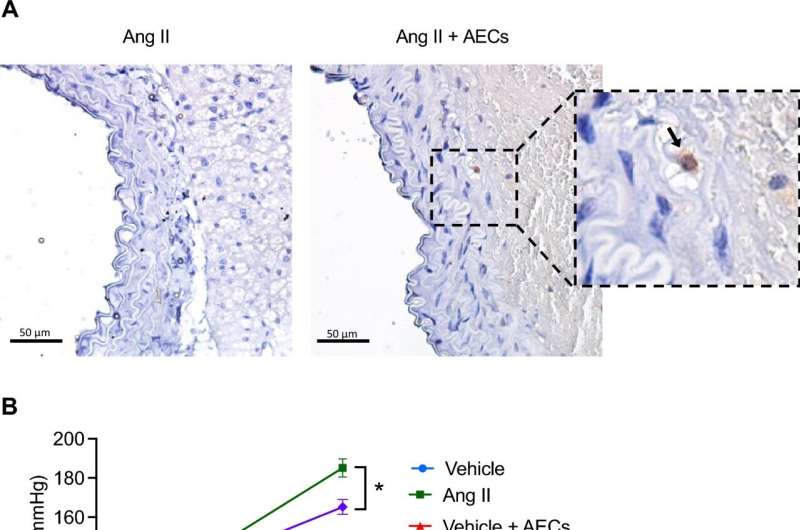This article has been reviewed according to Science X's editorial process and policies. Editors have highlighted the following attributes while ensuring the content's credibility:
fact-checked
trusted source
proofread
Placenta cells may lower blood pressure

Scientists from La Trobe University and the Hudson Institute have demonstrated that cells from placentas could have therapeutic benefits for patients suffering from high blood pressure.
The research, led by La Trobe senior lecturer in physiology and pharmacology, Dr. Michael De Silva, and published in Scientific Reports, has advanced La Trobe's recent studies into using placenta cells for stroke recovery and has passed human safety trials.
In the next phase, this new therapy will be assessed for its efficacy in reducing brain injury caused by stroke, pending Therapeutic Goods Administration approval.
"Here we have built on the groundbreaking results of La Trobe's previous studies using these cells in stroke models," Dr. De Silva said. "If infused within a day after a stroke, the cells target the affected area of the brain, and reduce inflammation and nerve cell death."
"We realized that we could test if similar protection could be seen in reducing the damage high blood pressure causes in the body and we found that the treatment reduced inflammation in blood vessels," Dr. De Silva said.
High blood pressure, also known as hypertension, is the leading cause of strokes and heart attacks, and over time creates inflammation in the arteries and can lead to vascular dementia. More than one in every three Australians over the age of 18 has high blood pressure.
The research team at La Trobe led by Dr. Michael De Silva, Dr. Quynh Nhu Dinh, and Professor Chris Sobey found that the cells, collected by the Hudson Institute from placentas donated by mothers after cesareans, reduced inflammation and prevented cognitive impairment.
"Blood pressure control rates are at an alarmingly low level of 32% in Australia. While a drug can reduce high blood pressure, these cells could target inflammation in the arteries caused by hypertension and therefore reduce the associated risks of cardiovascular disease and cognitive impairment," Dr. De Silva said.
Dr. De Silva said while the research was in its early stages and the team would continue to work on how this knowledge may benefit patients with high blood pressure, he was satisfied to see that this research could eventually lead to a new form of therapy that reduced damage to blood vessels and the brain when blood pressure was high.
More information: Quynh Nhu Dinh et al, Human amnion epithelial cell therapy reduces hypertension-induced vascular stiffening and cognitive impairment, Scientific Reports (2024). DOI: 10.1038/s41598-024-52214-0


















